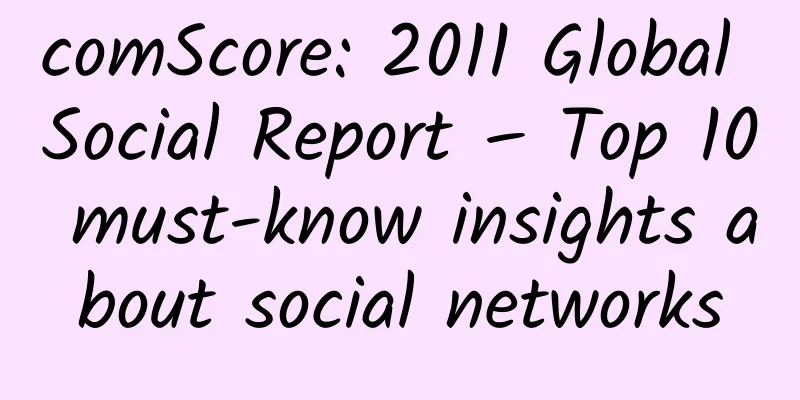comScore: 2011 Global Social Report – Top 10 must-know insights about social networks

|
Social networking is a global phenomenon, and it is reshaping online and offline business. comScore has released the latest social networking research report. Let's appreciate the key points of the report together: 1. Social networking is the most popular online activity in the world. For every 5 minutes spent on the Internet, one minute is spent on social networking, which is the most popular online application in the world. Social networking reaches 82% of Internet users over the age of 15 worldwide. Whether at home or at work, there are 1.2 billion social networking users worldwide. 2. Social networking behavior transcends global geographical differences. Social networking is very popular in all countries. From 53% usage in China to 98% Internet user coverage in the United States, social networking is a global phenomenon that transcends national boundaries. However, the degree of immersion in social networks varies from country to country. In terms of average monthly time spent, Israel and Argentina have the longest average monthly usage time, 11.1 and 10.7 hours respectively. In terms of regional and gender differences, the usage of social users in Latin America, Europe and the United States is relatively high, while the usage in the Asia-Pacific region is still relatively low, and women are more immersed in social networks. 3. Can Facebook be more powerful? To understand social networks, we have to talk about Facebook. Facebook is the world's largest social network and drives the development of the entire social network. Currently, Facebook is the world's third largest website, second only to Google and Microsoft websites. In October 2011, Facebook's global audience reach reached 55%, accounting for 3/4 of the time people spend on social networks. For every 7 minutes of online activities of global users, 1 minute belongs to Facebook. Facebook is a force that connects the world, but it has not conquered some countries, including Brazil, China, Japan, Poland, Russia, South Korea and Vietnam; leaving aside China's blockade, Facebook is also thriving in other countries and is expected to become a leader. 4. Weibo has become a new force in social networks Weibo is a form of communication that uses short messages. It has become a new star in the global social network in recent years. This is mainly due to the development of Twitter. Since the spring of 2009, the number of users has increased rapidly. Currently, one in every 10 Internet users is a Twitter user, and the number increased by 59% in 2011 compared to 2010. Interestingly, Weibo is not just a communication tool between friends. In 2011, Twitter became the center of communication for global or regional hot events. From the Middle East to the earthquake and tsunami in Japan, to the death of Bin Laden, to Steve Jobs, Weibo has become the center of people's topics. 5. Local social networks should be strengthened The United States is the leader in social networks. Homegrown Facebook, Twitter, and Linkedin are becoming global phenomena, with great influence in many regions outside the United States. The vast majority of users of these sites come from outside the United States. At the same time, some local social networks around the world have also begun to expand overseas, attracting a considerable amount of overseas traffic. VKontakte is currently the seventh largest social network in the world. It used to be dominated by Russian users, but now 43% of its traffic comes from outside Russia, up 10 percentage points from 2010. Another social network Odnoklassniki also has 41% of its traffic from overseas. 6. Social networks are no longer just for young people. Everyone can have a share. In the past we could say that social networking was for kids, but in the past 18-24 months this has changed dramatically. Social networking has started to make inroads into older people and is gaining widespread use across all age groups. In fact, social network usage is growing fastest among users aged 55 and over. In some countries and regions, the data is even more impressive. For example, in North America and Latin America, the penetration rate of social networks among Internet users aged 55 is as high as 93%. Another change is that the proportion of men using social networks is also rising rapidly. As social networks integrate more online applications such as video, the difference between men and women will be significantly reduced. 7. Digital Natives’ Communication Methods Are Social The group aged 15-24 grew up in the Internet era, accompanied by digital media and the Internet. They are called digital natives and represent the new Internet power. By analyzing their behavior, we can find out the future direction of the Internet. From July 2010 to October 2011, the group aged 15-24 saw the largest decline in the use of IM instant messaging software and email, while the use of social networks by this group increased the fastest. As these groups gradually become the dominant force in socialization, social networks will become the mainstream of the era. 8. US social network advertising display leads, although revenue has not caught up Social networks are leading in various indicators, accounting for a quarter of US ad impressions (28%) in October 2011, and another 5% of US ad impressions are social enhanced ads. As social networks continue to dominate in PV and duration, it is not surprising that advertisers are shifting their funds. However, despite the outstanding performance of social networks, their value has not been fully released. Although more than a quarter of ads are displayed on social networks, advertisers only spend 15% of their money on them. When talking about social network advertising, we have to mention Facebook. In terms of ad impressions, Facebook occupies the largest share. In the third quarter of 2011, Facebook displayed 28% of ad impressions, exceeding the combined total of the other four portals. The main reason is that its advertising is positioned in the long tail, that is, small and medium advertisers. In the past few years, it has also actively attracted investment from large advertisers. Original compilation by 199IT. Please indicate the source as 199IT when reprinting: //www.199it.com 9. The future is still unclear When Facebook started in 2004, it faced competition from Myspace and other leading social networking sites. Less than five years later, it surpassed these sites and became the global leader in social networking sites, and the industry leader in many countries and regions. Users are willing to abandon other sites and join Facebook because of its network effect, because their friends are all on it. Just as Facebook has achieved its current glory, new social networks may also replace it. For example, Google's Google+ is growing at a rapid rate, and Twitter is also its potential competitor. Others like Twitter, Linkedin, Sina Weibo, etc. are growing very rapidly and are reshaping the landscape of social networks. In terms of usage time and immersion, Facebook, ODNOKLASSNIKI, Tagged, tumblr, PINTEREST and Sina Weibo are all growing rapidly. 10. Social networks catalyzed by mobile Thanks to its mobility, mobile will catalyze the development of social networks. In October 2011, nearly one-third of mobile phone users aged 13 and above in the United States used social networking sites at least once a month. Mobile social networks have a high penetration rate in the United States and the United Kingdom. Smartphones are the key driver of social network usage, with users using social networks via apps more than browsers. However, the power of mobile has not yet become mainstream, and the number of people using social networks through mobile apps and mobile browsers is still far lower than that of traditional Internet. People use mobile social networks for various purposes, and posting status and reading friends' content are more common. Mobile and other connected devices are igniting a new wave of applications. Is this the future of mobile social networking? Original compilation by 199IT. Please indicate the source as 199IT when reprinting: //www.199it.com |
<<: Can you get HPV by using a public restroom? You may have some misunderstandings about HPV
Recommend
Is the quality of blastocyst 4bc good?
Speaking of what can directly affect the success ...
Is it a problem for babies to suck their fingers? Don’t stop your baby from “tasting” the world with his mouth
People often say that "a child's hands a...
Yellow vaginal discharge with odor and vulvar itching
Various gynecological diseases pose a great threa...
What should I do if the rolled dough becomes hard overnight? Will eating rolled dough make me fat?
Rolled noodles evolved from cold noodles in the T...
What is wrong with my period being dark brown?
Women will encounter many gynecological problems ...
How many days of rest is best for medical abortion
There are two main ways for modern people to term...
Did you skip brushing your teeth after dinner? Beware of bad breath tomorrow morning!
When you are lying in bed getting ready to fall a...
A woman dreams of herself laughing
Laughter is a form of expression of happiness and...
What should I do if my breasts swell after induced labor?
Breast engorgement will also occur after induced ...
What is the normal thickness of the endometrium?
The uterus is a relatively important reproductive...
How long will it take to miscarry without yolk sac?
The yolk sac has a great influence on the test tu...
Why do I have stomach and back pain during ovulation?
Many women experience back pain and stomach pain ...
Why is 40 a threshold for presbyopia?
Audit expert: Liu Dongbao Chief Physician of the ...
How to treat postpartum eye pain
There are many symptoms caused by postpartum dise...









